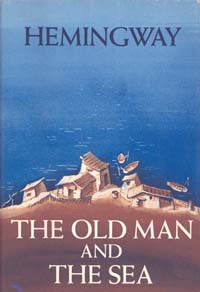The Old Man and the Sea

Original book cover
|
|
| Author | Ernest Hemingway |
|---|---|
| Country | United States |
| Language | English |
| Genre | Literary Fiction |
| Published | 1952 (Charles Scribner's Sons) |
| Media type | Print (hardback & paperback) |
| Pages | 127 |
| Awards | Pulitzer Prize for fiction (1953) |
| ISBN | |
| OCLC | 19793 |
| 813.52 | |
| LC Class | PS3515.E37 |
The Old Man and the Sea is a short novel written by the American author Ernest Hemingway in 1951 in Bimini, Bahamas, and published in 1952. It was the last major work of fiction by Hemingway that was published during his lifetime. One of his most famous works, it tells the story of Santiago, an aging Cuban fisherman who struggles with a giant marlin far out in the Gulf Stream off the coast of Florida.
In 1953, The Old Man and the Sea was awarded the Pulitzer Prize for Fiction, and it was cited by the Nobel Committee as contributing to their awarding of the Nobel Prize in Literature to Hemingway in 1954.
The Old Man and the Sea tells the story of a battle between an aging, experienced fisherman, Santiago, and a large marlin. The story opens with Santiago having gone 84 days without catching a fish, and now being seen as "salao", the worst form of unluckiness. He is so unlucky that his young apprentice, Manolin, has been forbidden by his parents to sail with him and has been told instead to fish with successful fishermen. The boy visits Santiago's shack each night, hauling his fishing gear, preparing food, talking about American baseball and his favorite player, Joe DiMaggio. Santiago tells Manolin that on the next day, he will venture far out into the Gulf Stream, north of Cuba in the Straits of Florida to fish, confident that his unlucky streak is near its end.
On the eighty-fifth day of his unlucky streak, Santiago takes his skiff into the Gulf Stream, sets his lines and, by noon, has his bait taken by a big fish that he is sure is a marlin. Unable to haul in the great marlin, Santiago is instead pulled by the marlin, and two days and nights pass with Santiago holding onto the line. Though wounded by the struggle and in pain, Santiago expresses a compassionate appreciation for his adversary, often referring to him as a brother. He also determines that, because of the fish's great dignity, no one shall deserve to eat the marlin.
...
Wikipedia
